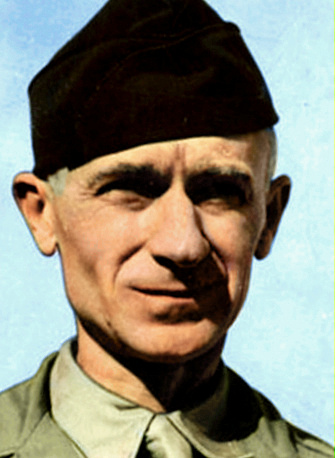
Roving Reporter
By Ernie Pyle
IN THE WESTERN PACIFIC (delayed) – There are moments when a voyage to war has much of the calm and repose of a pleasure cruise in peacetime.
For day after day, we sailed in seas that were smooth and warm, under benign skies. There was no air of urgency about us. True, we kept air patrols in the sky, but it was really a practice gesture, for we were far away from any enemy.
Sailors at work wore no shirts. Little bunches of flying fish skimmed the blue water. You needed dark glasses on deck. Pilots took sun baths on the forecastle.
Up on the broad flight deck, clad only in shorts, the chaplain and executive officer were playing deck tennis. And in the afternoon the forward elevator was let down, the officers and men played basketball.
Every night we had movies after supper. It was hard to keep it in your mind that we were a ship of war, headed for war.
Then ever so gradually the weather changed, as we plowed northward. Yesterday and all the days behind it had been tropically hot. Today was surprisingly and comfortably cool. Tomorrow would be cold. We were nearing the great hunting grounds off Japan.
On the last day you could sense the imminence of it all over the ship. Not by anything big, but by the little things. Our weeks of monotony and waiting were at an end.
The daily briefings of the pilots became more detailed. There was less playboyishness among the crew. Ordinary ship’s rules were changed to battle rules.
What is known as the “extended action bill” went into effect. Sailors could let down their racks in the daytime, and get a little extra rest.
Captain stays on bridge
Meal hours, instead of being at 12 and 6 o’clock sharp, were changed to run from 11 till 1, and from 4:30 and 6:30, so that men on watch could trade off and dash in for a bite. The captain never left the bridge, either to eat or sleep.
When you came into your cabin, you found your bunk had been made up with a “flash sheet” around it. That is a black rubberized sheet, to protect you from bomb burns.
Everybody was issued “flash gear.” That consists of several items – a thin grey hood that covers your head and hangs down over your shoulders; a white cloth on an elastic band to cover your nose and mouth; isinglass goggles for your eyes; and long gray cloth gloves with a high gauntlet.
All of this to save your hands and face from the searing, flamethrowing blast of a big shell or bomb when it explodes. On some ships the men paint their faces with an anti-flash grease, making them look like circus clowns, but we didn’t on our ship.
On the lower decks, every compartment door was closed. This was done so that if a torpedo should hit, it would flood only the compartment where it struck. All the rest of the ship would be sealed off from it.
The ship’s hospital was shut off, and the medics set up business in the many prearranged and stations scattered on higher decks about the ship. They could even perform operations at any one of a dozen temporary spots set up in mess halls or cabins.
Long underwear comes out
Also, we broke out cold weather gear for the bone-chilling days ahead. An extra blanket was put on our bunks. Blue Navy sweaters came out for the first time. And blue stocking caps, and several kinds of rain capes with a parka, and you even saw a few pea jackets.
And yes, believe it or not, we even had long underwear too. It had never been used before, and goodness knows how long it had been baled up in shipboard stockrooms.
Some of it was moldy. In fact, the suit they got out for the captain – well, they had to wash and dry it hurriedly before giving it to him, because it smelled so badly from mold.
After supper on the night before our strike, we saw the movie The Magnificent Dope. I guess it’s old, but it was good and awfully funny.
At least we thought so, for everybody laughed hilariously. When tension builds up in a man before a period of great danger, the tension is usually inner, and not often visible. That’s the way it was at the movie that night.
Except I noticed there were only half as many people at the movie as usual. And not long after it was over, everybody had gone to bed. For they knew there would be no rest tomorrow.